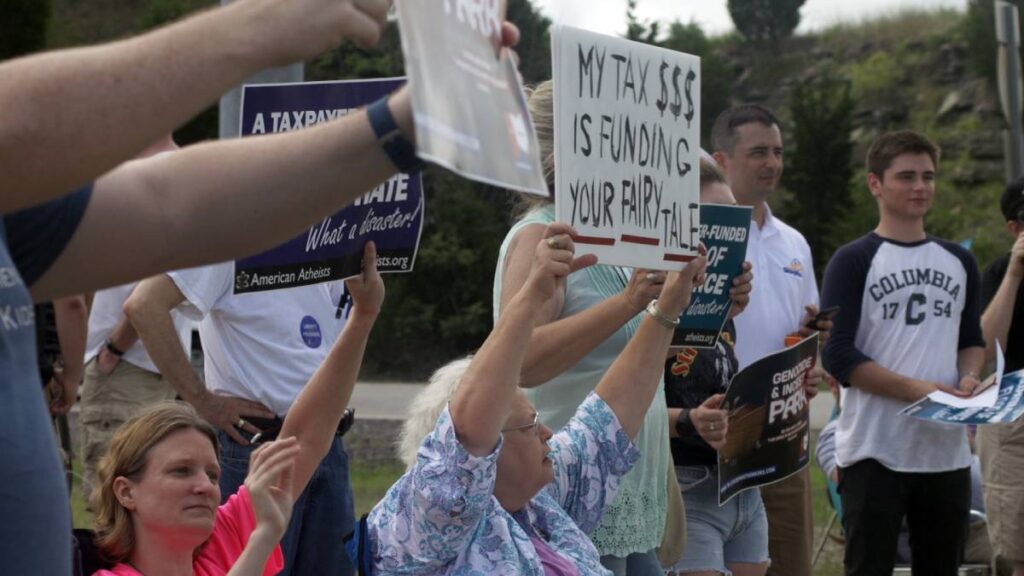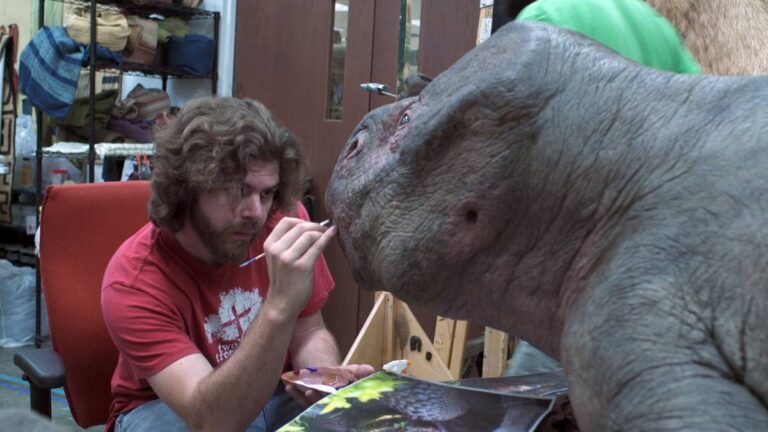“This is a fossil created during Noah’s flood,” says Doug Henderson, lead exhibit designer at the Creation Museum. He’s referencing a complete Allosaurus skeleton recently donated to the museum, which will be the centerpiece of a new exhibit. “People think we don’t believe in dinosaurs, but we believe in dinosaurs. We believe dinosaurs lived at the same time as man.” This point of view is shared by many of the subjects in the new documentary from Monica Long Ross and Clayton Brown, aptly titled We Believe in Dinosaurs, which premiered at the 2019 San Francisco International Film Festival.
The film chronicles the Creation Museum’s quest to build a lifesize replica of Noah’s Ark and turn it into an “educational” theme park which purports to debunk the theory of evolution by positing that dinosaurs were the result of divine creation (on the sixth day, along with all other animals), that most of them were destroyed in the great flood depicted in the Bible, and the ones who survived aboard the ark subsequently perished “for some reason” and have now become extinct, “as far as we know.”
As for the fossils, like the aforementioned Allosaurus? If you ask Georgia Purdom, the Creation Museum’s resident molecular geneticist, they’re not millions of years old, but only a few thousand years old. After all, it would be impossible for the Earth to be any older than that, based on the teachings of Genesis. “If we don’t take what the Bible says in one part as true, it becomes a problem for the rest of the Scripture,” she says. “If only part of it’s true, then how do you know any of it’s true?”
The residents of Williamstown, Kentucky see the Ark Encounter as a means of salvation for their struggling town, hoping the influx of visitors from around the world will lead to a tourism boom and stimulate the local economy. But for others, the park’s discriminatory hiring practices — a mandated “personal relationship with Jesus Christ” and “regular attendance at a Bible-believing church” are in every job description — are an affront to the separation of church and state, particularly after the Ark Encounter receives more than $18 million in tax breaks.
The multi-year journey features a number of fascinating and complex personalities, including Dan Phelps, a geologist and head of the Kentucky Paleontology Society who serves as a frequent and vocal critic of the museum’s faulty science; David MacMillan, a former creationist who could no longer reconcile his beliefs with the facts of the real world; and the Tri-State Free Thinkers, an atheist group who show up on opening day to protest the museum’s message of “incest and genocide,” for which a conservative radio host condemns their leader to an eternity of damnation.

Notably absent are any direct interviews with Ken Ham, founder of Answers in Genesis, the organization that runs both the Creation Museum and the Ark Encounter. His presence is felt throughout the film in footage from public appearances and speaking engagements — including an unsettling bit of indoctrination where he teaches young children to challenge science — but it would have been interesting to witness firsthand his rebuttals against the criticisms levied by the film’s other subjects.
We Believe in Dinosaurs illustrates the ever-growing divide between religion and science, and manages a fairly even-handed portrayal of both sides of the debate, despite the clear skepticism of the filmmakers toward the Creationist belief system. Some stones are left unturned, and it would have made for a compelling addition to explore the conflict between the teachings of Answers in Genesis and their actions, such as Ham’s decidedly non-Christian scheme to escape tax liability by selling the Ark Encounter land to his own non-profit organization for $10. But the existing material is certainly captivating and disquieting enough to engage with.

